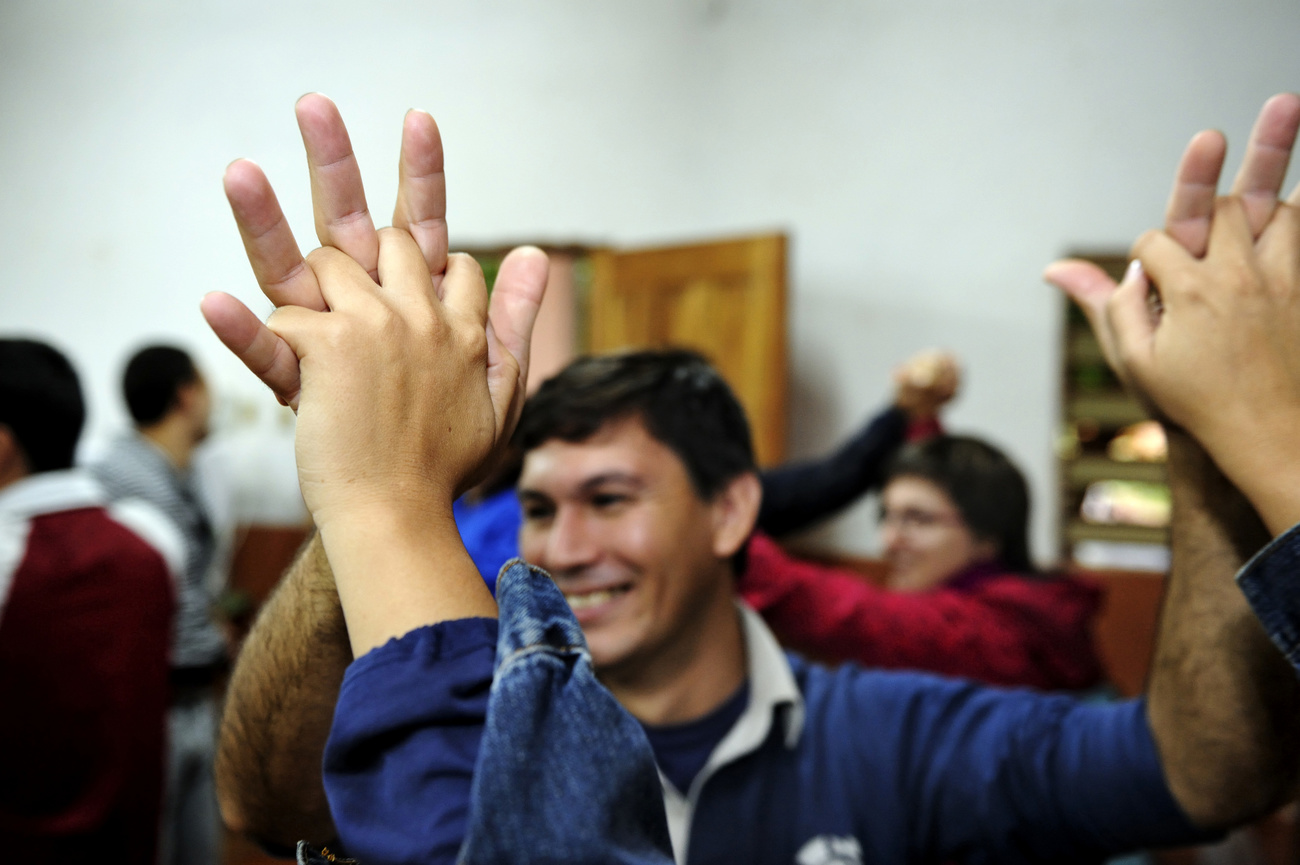Covid: Why the post-pandemic reset is easier said than done

Switzerland is trying to get back to “normal” after two years of pandemic-related restrictions. But the coronavirus crisis has radically altered our social behaviour and taken a toll on everyone’s mental well-being, particularly of youth. In an interview, psychotherapist Carola Smolenski reflects on what is needed, and why the term "Covid generation" may be here to stay.
The number of young people in need of treatment for suicidal thinking at the University Psychiatric Clinic in Zurich has increased dramatically since the outbreak of the coronavirus pandemic. Youth psychiatrists are extremely busy across the country. That is just one indication of the extent of the wounds that living in crisis mode left in the population of otherwise prosperous and peaceful Switzerland.
Now, with Covid-19 infection rates dropping and a stable situation in hospitals, a path to normalcy seems possible. What lessons can we draw as a society from the trials and tribulations confronted during the pandemic? Dr. Carola Smolenski, psychotherapist and member of the executive of the Federation of Swiss Psychologists, shares her views on the risks and opportunities of this turning point.
SWI swissinfo.ch: How did the pandemic scar us?
Carola Smolenski: Some people found themselves dealing with constant stress. They may have been mourning losses in their lives, experienced restrictions on their working and private life, or had the sense they were losing control. That made them increasingly unsure of themselves in their social contacts. Some people are saying they have forgotten how to interact with people, make new friends, give or take a compliment – whether in their working or personal lives. They’ve forgotten how to be closer than a metre and a half to anyone. We need to get used to that kind of normality again; and give ourselves a chance to get used to it.
SWI: Did the psychological impact of the pandemic get enough attention?
C.S.: Some basic needs were neglected. There are certainly human needs that go beyond food, drink and sleep: experiencing relationships of trust, having fun, having a sense of direction and control of one’s life, but also having a clear view of where it’s all going. A feeling that one has some say in the course of one’s own life. And the feeling of being valued, getting positive feedback from others.
SWI: What happens to us when these things are missing?
C.S.: If one or more of these basic human needs are unsatisfied or if they are denied – repeatedly or over an extended period of time – it can make our mental system less stable, or more vulnerable. That’s the theory. And when that goes on for too long, we become more prone to mental illness. This perception can be applied to the whole period of the pandemic. In many areas, these basic human needs were denied or frustrated, periodically or even constantly.
SWI: What would be an example of this?
C.S.: The need for close, trusting relationships. I am not just talking about love relationships, but also friendships, and enjoyable spontaneous interactions with people we know, whether in the workplace or in our free time.
SWI: Is it going to be difficult, then, to get back to normal?
C.S.: Most people are quite resilient and can get back into their stride even after difficult experiences. But some will have a harder time. It might be people who during the pandemic withdrew socially, whether they did it consciously or unconsciously. There might be many reasons for this: they belonged to an at-risk group, they lost their jobs, they found themselves barely surviving, or they had a previous history of mental health problems. People suffering from depression or anxiety may have welcomed home-office and found it positive, because they now no longer needed to feel anxious or unsure of themselves in social situations. For such people, getting back to normal is likely to be a considerable challenge.
SWI: What lessons can we learn from this crisis?
This pandemic has shown us that we must learn to deal with the feeling of not having control. Here in Switzerland we have a stable health-care system and a stable political environment, and a good chunk of the population has access to financial resources and modern technology. Yet we too have come to realise that we do not control everything, not by any means, and that many things can change very quickly. That experience has been a shock for many, and they are having trouble dealing with it.
As psychotherapists we have been finding that, due to the pandemic, mental health has become more of an issue for people. Now, I hope that that awareness remains. It would be a very positive result of the pandemic if we paid more attention to our mental well-being and discussed it more often and with fewer inhibitions. That would mean that we are more careful with our inner resources, that we strengthen them in any way we can, and that if we get to a stage where we are unable to cope on our own, we seek professional help without delay.
SWI: Young people have been particularly affected. How did they experience the pandemic?
C.S.: We will have to get used to having the term “Covid generation” in our vocabulary for a while yet. This age-group have had to do what they could to meet their needs, in spite of the restrictions, and go through the maturing process. For them, the pandemic arrived just at a stage in their development they were discovering personal autonomy and trying it out. In this important phase of life, young people are getting away from their family home, trying out all kinds of new social contacts, and having romantic relationships. Many found this whole process was heavily restricted.
SWI: And what were the consequences of this?
C.S: Studies show that a large proportion of young people are suffering, and that they are having to deal with anxieties about the future, uncertainty, depressed feelings, and even thoughts of suicide.
Mental health will remain an issue for many young people even after the pandemic. This may have a positive side, if it frees mental health from being a taboo topic. And again, it might also make these young people have a better appreciation of health and self-care, maybe even develop a greater sense of responsibility in dealing with more vulnerable people or with the older generation.
SWI: Does that mean that the coronavirus crisis could share a generation with more solidarity, which might be better able to deal with the global challenges facing humanity?
C.S: I would not want to equate the pandemic with a traumatic experience, but in the trauma field there is a concept known as “post-traumatic growth”, which can come after trauma: if someone is able to work through a crisis in a positive way, then there is a good chance they will be able to get something out of this difficult experience and grow, develop and become a stronger person.
SWI: How can we support young people in doing this?
C.S.: The crucial point, I think, is to have an awareness of and solidarity with the younger generation. They are going to need more space where they can catch up on at least some of the age-specific experiences they missed out on during the pandemic, due to the restrictions. I also think that, now that the restrictions are being relaxed, attention needs to be paid to the mental state of children and youth – and adults too. It is a responsibility for our society, I believe, that even after the end of restrictions, professional help should be available for all of us who find the road back to normal living a challenge.
More
Translated from German by Terence MacNamee

In compliance with the JTI standards
More: SWI swissinfo.ch certified by the Journalism Trust Initiative













You can find an overview of ongoing debates with our journalists here . Please join us!
If you want to start a conversation about a topic raised in this article or want to report factual errors, email us at english@swissinfo.ch.